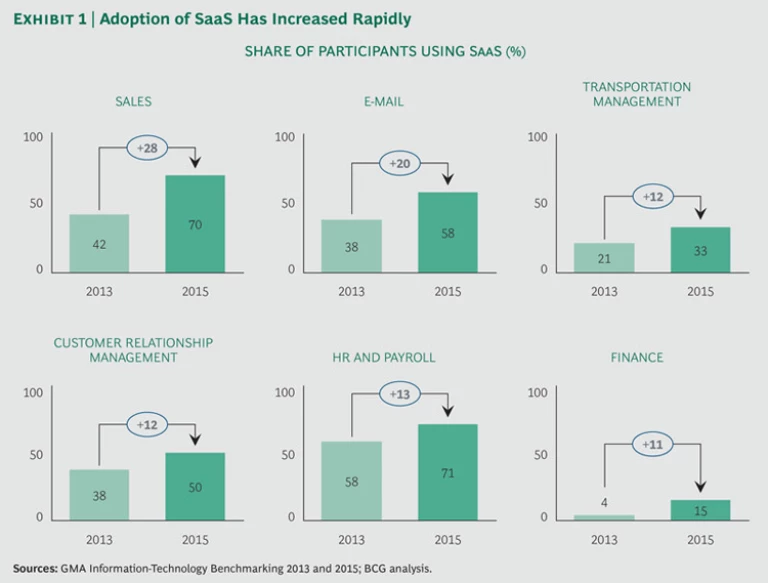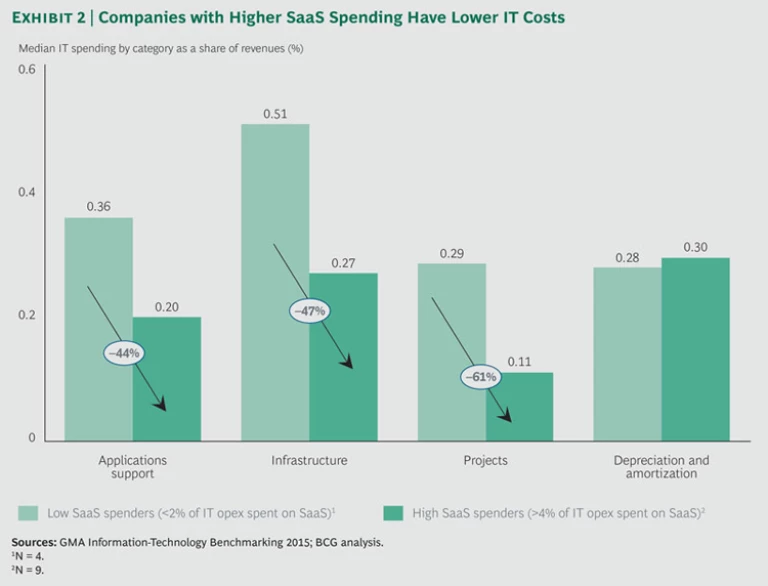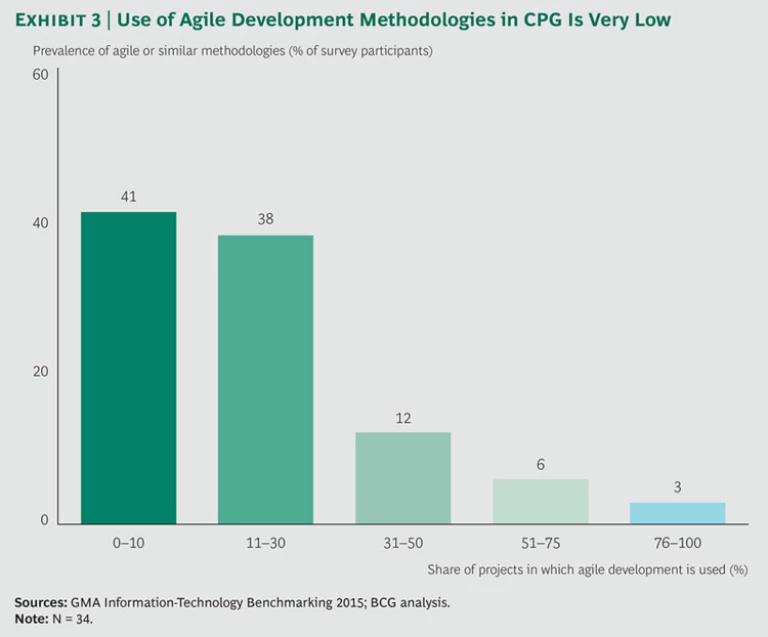The consumer packaged goods (CPG) industry is in the midst of a major transformation driven by changes in technology and dramatic shifts in consumer preferences. At the same time, the pressure to keep costs low and operate more efficiently has never been so intense. CIOs in the CPG industry need to successfully navigate these turbulent forces to position IT as an enabler of business value within their companies.
To understand how the IT function in CPG companies is responding to the ongoing technology and industry transformation, The Boston Consulting Group and the Grocery Manufacturers Association (GMA) conducted extensive benchmarking on a variety of strategic IT topics. This report is based on a survey of 37 CPG manufacturers in the U.S. and Europe, conducted in the first half of 2015, and supplemented by interviews with more than 15 CIOs of participating companies. It also draws on BCG’s experience working with many of the leading CPG manufacturers and retailers globally.
While the research was conducted collaboratively by BCG and GMA, BCG is wholly responsible for all analyses, conclusions, and recommendations.
A company starting out fresh today has little reason to use on-premise software. With software as a service solutions available for nearly every business process, the primary challenge lies in sorting through the hundreds of vendors in the marketplace to find a suitable solution from a stable provider. While large and established companies will continue to maintain some on-premise software, the findings from Navigating the New World of IT in Consumer Packaged Goods are unequivocal:
- SaaS use in CPG companies is now mainstream, and adoption rates continue to increase. The move to SaaS is an explicit element of some CPG companies’ IT strategy. Land O’Lakes has implemented a SaaS-first strategy and aims to “get out of data center operations over time,” according to the CIO.
- With agile methodologies, however, the story is quite different. Although agile is widely used in the new generation of high-tech and e-commerce companies and is quickly spreading to other technology companies and to the e-commerce divisions of large companies, our survey of 37 CPG manufacturers in the U.S. and Europe reveals that the CPG industry is a laggard when it comes to agile adoption. This is a tremendous opportunity for CPG CIOs. Agile can help reduce costs, increase application development speed, and improve developer productivity.
The Rise of SaaS
From 2015 through 2018, the global SaaS business is forecast to grow at more than twice the rate of traditional, on-premise enterprise software. CPG companies are
What drives SaaS adoption? SaaS solutions can improve application management and lower costs. Onetime implementation costs for SaaS solutions are often lower than for traditional on-premise applications because of limited customization. Expenses for periodic upgrades are avoided because the vendor continually makes updates. Application support costs are lower as well because they are included in SaaS subscription costs, and migration to SaaS can substantially lower infrastructure costs.
One company that participated in our survey found that the implementation of SaaS radically altered its plans to increase data center capacity. Although it originally projected an upgrade need in 2014, the company discovered that, as a result of its SaaS deployments, it wouldn’t need a capacity increase for another three years.
High-volume users of SaaS see as much as 61 percent lower IT costs compared with low adopters of SaaS. (See Exhibit 2.) While the benefit can be substantial, CIOs starting the journey should be prepared to manage the challenges that come with SaaS deployments:
- Upgrades are mandatory. With on-premise software, upgrades can be deferred as a way to manage costs in a fiscally challenging year. Some CIOs even choose to go “off maintenance” for systems they do not expect to upgrade for a long time. With SaaS, this strategy is off the table—there is no way to avoid SaaS subscription charges as long as the system is being used.
- Integration with existing systems may be difficult. SaaS solutions are rarely deployed on a stand-alone basis. They typically exchange data with on-premise HR, finance, supply chain, and other systems. As a result, a single SaaS deployment may result in a cascading series of other upgrades. This can become a pressing problem if upgrades have been deferred for many years.
- Licensing requirements may be onerous. One attraction of SaaS is the ability to pay subscription charges based on the actual number of users and not be locked into multiyear fixed contracts. Unfortunately, some SaaS vendors offer contracts that are not materially different from traditional on-premise license agreements. CIOs should take this into consideration when selecting SaaS vendors.
For companies embarking on the journey to SaaS adoption, we recommend the following path: Begin with simple back-office processes, such as travel and expense management, recruiting and talent management, and e-mail. Next, move customer service, sales force management, knowledge management, reporting, and analytics to a SaaS solution. Finally, companies may deploy ERP, supply chain, and finance at the end of their SaaS-migration process; even then, it is typically used only in small markets or for acquisitions in emerging markets.
The Agile Transformation Imperative
Agile development is here to stay—but it hasn’t yet been widely adopted within the CPG industry. This may be because agile represents a significant departure from the classic “waterfall” methodology commonly used in IT. Agile is a fundamentally different software-development methodology that incorporates iteration and customer feedback to continuously refine and deliver products.
Hallmarks of agile development include the following:
- A “minimum viable product” is created in two- to four-week development cycles called sprints.
- Products are reviewed by business owners and customers before the next sprint begins.
- Decisions on what to build in each sprint are made by a “product owner” (in contrast to traditional business analysts, who document detailed requirements but don’t own the product development priorities).
- “Scrum masters” facilitate teams of five to nine people who self-manage their work to deliver the product.
Agile development is widely used in the high-tech space and is now a well-established practice at many technology companies. Over the past few years, other industries have followed suit, especially those facing widespread digital disruption, such as banking, travel, and retail. While the starting point is typically with e-commerce and analytics, agile methods often spread to other projects, such as ERP customization.
The CPG industry has been slow to adopt agile methodologies. Of the companies surveyed, 41 percent said that they use agile in no more than 10 percent of IT projects, and 38 percent said that they use it in only 11 to 30 percent of projects. In other words, nearly 80 percent of survey participants use agile in very limited ways. (See Exhibit 3.)
Companies that use agile can expect reduced costs (10 to 20 percent lower), faster time to delivery (in some cases twice as fast), much lower defect rates, and higher customer satisfaction—an extremely attractive set of outcomes.
But adopting agile development is neither quick nor easy. It requires sponsorship from both business and IT leaders, a dedicated transformation team, and a willingness to change culture, values, and work processes. Starting with a few low-risk but high-profile projects, we have seen successful transformations that proceed in three- to six-month waves, lasting up to three years. (The sidebar “Agile Transformation Success” shows how one CPG company adopted agile for all IT projects over a three-year period.)
AGILE TRANSFORMATION SUCCESS
ConAgra Foods, one of North America’s leading packaged-food companies, has fully adopted agile development practices. Today, the company’s entire IT team of more than 600 people is trained in agile and uses the methodology for all IT projects.
ConAgra Foods’ journey began more than three years ago, when an external provider piloted agile projects with a small team of developers. The provider trained a cohort of agile coaches within ConAgra, and that team then brought agile to the rest of the IT organization.
Today, the company has a standing team of agile coaches to support ongoing IT efforts. For many projects, product owners are staffed from the business instead of IT, ensuring a tight feedback cycle of sustained business engagement. Development occurs in three-week sprints, and business users must formally review the output of every sprint. Production releases, however, occur at three- to six-month intervals after a suitable number of sprint cycles have been completed.
As a result of embracing agile, ConAgra’s IT team works as a true partner with the business to deliver new technology-enabled capabilities—and company-wide satisfaction with IT is higher than ever.
SaaS and Agile allow companies to move quickly, experiment boldly, and execute on big ideas. In our competitive and fast-changing world, where technology is transforming virtually every business process, CIOs must embrace capabilities that facilitate rapid execution and growth. Getting the most from SaaS and Agile methodologies should be on every CPG company’s agenda.











